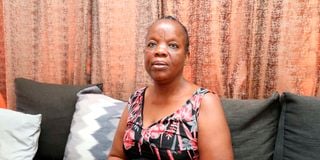
Grace Akinyi Onyango, 53 a resident at Kibra, Nairobi shares her experience of losing two sisters to femicide on January 30, 2024.
“Attending the #EndFemicideKE march was something very close to my heart. I lost two of my sisters in the hands of those that they loved. This has directly affected me because I am a mother of four girls and a son.
I was brought up in a large polygamous family in Kano Kolua in Kisumu County. My father had two wives. My mother – the first wife – had 12 children. My stepmother was a cousin to my mother and the polygamous family set-up was so lovely. Our father was so supportive and all of us attended school.
After Form Four, I got married at a tender age in 1991 when I was only 19. I have been married for 32 years. Being the eldest daughter in that family, I took care of my younger sisters, among them – Monicah Akuku Onyango and Rose Akoth Onyango. I was like their second mother.
We tried to rescue our sister but she was deeply in love
My younger look-alike sister, Rose Akoth Onyango was so bubbly and full of life. She at some point lived with me here in Kibra and people would confuse us. She was always smiling. She was so quiet and couldn’t tell when she was being abused. What makes me sad is that we tried to help her out but we couldn’t because she was deeply in love.
Rose had dropped out of secondary school while in Form Two and got into a toxic relationship in Kisumu where she was cohabiting with a man. I could see that she was not happy.
All of a sudden she started drinking. When I informed our brother, he told me that Rose was being beaten by the boyfriend.
The man would attack her with knives and pangas. In the first incident – she sustained deep cuts in her head and body. She was taken to Wema Healthcare in Nyamasaria where she was treated.
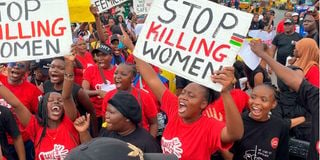
Residents of Mombasa during the anti-femicide protest on January 27, 2024.
This scarred her beautiful body. Occasionally, the man would threaten her that no other man could marry her because of the ugly scars.
The second time, she sustained deep cuts in the head. Shocked, the neighbours called us, “Omondi anaua Rose!” They feared Omondi and didn’t want him to know that they were volunteering this information.
It also happened that the grandmother of the man came from our clan and my parents were against the relationship. But Rose loved this man such that whenever she ran away, he would lure her back. We tried to rescue our sister but we couldn’t.
The third time, Rose sustained cuts all over her body and we reported the matter to the police. She was the complainant, but before the matter kicked off, she had got back to her assailant. She told us off, “It is my life!”
Sometime in 2021, she was attacked again, and now she wanted to end the relationship. She went back to pick up her clothes but the assailant threatened her that he would not allow her to go to another man.
We do not know what happened, but our sister was found in a tunnel next to the bus stop. Onlookers could see some movement, and when they came closer Rose sent a faint cry for help “Si mnisaidie, mnisaidie… (Help me, help me…)”
They took her to Jaramogi Oginga Odinga Hospital. One of our sisters was called and shared the information in the family WhatsApp group. Some of my siblings rushed to check on her and confirmed it.
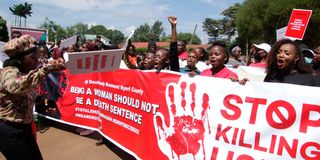
Women's rights activists and residents of Nyeri join a procession in Nyeri town to protest against the rise in femicide in the country. Feminists held a nationwide protest dubbed ‘Feminists March Against Femicide’ on Saturday, January 27, 2024.
They then left and visited again during lunch hour. What they found shocked them. Lots of blood in her bed – as though a goat or a cow had been slaughtered – and Rose lay dead.
We cannot explain what transpired at the hospital. Could it be that this man had followed her again?
The man’s mother comes from Uganda, so he escaped to the neighbouring country. Our parents had died. The post-mortem indicated that Rose had sustained deep stab wounds and lost a lot of blood. We made arrangements to have her buried hurriedly because it was during the Covid-19 pandemic.
Rose died at 30 and she didn’t leave any child. She was very outgoing and her death is still painful. We tried going to court but the culprit had escaped the police dragnet.
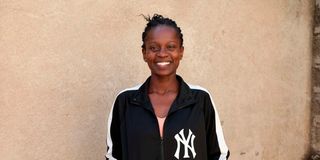
Terry Anne Awuor the ecofeminism lead at the Feminist for Peace, Rights and Justice Centre (FPRJC) in Kibera Nairobi on January 30, 2024.
Monicah had just found second love which left her dead
My younger sister Monicah Akuku Onyango had dropped out of secondary school and got married at a tender age. Later, the husband died. She remarried because she was still very young.
While at it they contracted HIV/Aids. Monicah had informed me that the husband was a womaniser. But also, he was suspecting that my sister had infected him with HIV. This had brought a lot of rifts within their marriage. They were always engaging in physical fights.
The neighbours used to inform us that Monicah was always badly beaten by her husband. She had left her sons with the in-laws in her first marriage. In 2007, that man stabbed my sister multiple times, left her dead and stuffed her body into a gunny bag. Then he threw it by the roadside in Oyugis town.
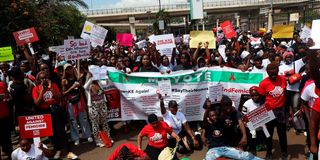
Nairobi residents take part in a procession called the 'Feminist March Against Femicide' on January 27, 2024, to protest against rising femicide in the country in recent months.
Early in the morning passersby saw what looked like human hair in a gunny bag in a trench, and the body was retrieved. News reached me that Monicah had died and the body was taken to Matata Nursing Hospital in Oyugis.
The body was later transferred from Matata Nursing Hospital to Jaramogi Oginga Odinga Hospital in Kisumu. My sister was buried at her late husband’s home.
My mother said she could not handle a court case, which she found hectic because of ill health. About two years later, the man succumbed in a road accident near Nyamasaria town.
These are two deaths that have traumatised me. Whenever any of my daughters informs me that they are in a relationship – I shrink because of those two incidences. I usually caution them not to be in a hurry.
Seeing images of the way Rita Waeni was dismembered made me so angry. I wept. She was slaughtered like a cow.
Every day, those images keep flipping in my mind. When this happens, I cannot even sleep.
I can still remember when my sisters were killed. But the death of Rita really shocked me as a mother of girls. It was the most painful experience in my life.
I cannot even fathom what her mother is going through. I cried seeing a helpless girl, so young having been killed because somebody somewhere took advantage of her, and the worst of it all he had to kill her.
Kenya is on a warpath. Our girls are vulnerable and with every passing day you really can’t tell who is next. This is mainly why I participated in the March. We had to inform the government and the international community that what is happening in Kenya–femicide–is not right. A woman is a human being. She must also live.
It touched me that a woman who was in a wheelchair had attended the #EndFemicideKE march. She cycled her wheelchair all the way from Jevanjee Gardens to Parliament and back. This sent a strong message that every woman is vulnerable and their life is sacred.
I also saw men who were in solidarity with women. It is rare to find such men. This was very powerful.”
Cases of Femicide in Kenya
- Over 500 – The total number of reported cases of femicide since 2016
- 20 – The number of reported cases of femicide in 2016
- 57 – The number of reported cases of femicide in 2017
- 95 – The number of reported cases of femicide in 2018, the highest
- 15 per cent – The estimated proportion of femicide cases that were perpetrated by strangers.
Source: Africa Data Hub
Africa Data Hub reports that most of the reported femicide cases were preceded by a pattern of abuse where the victims were subjected to domestic violence from their partners before they were brutally murdered. In the majority of cases, the murderer was a friend, relative, or intimate partner of the murdered woman.
NEED HELP?
1195 – Toll-free 24-hour national SGBV hotline and rapid response centre
116 – Childline Kenya 24-hour and toll-free line
0800720186 – CREAW Kenya 24-hour and toll-free line
1519 – Wangu Kanja Foundation 24-hour toll-free line
[email protected]Parliamentin








